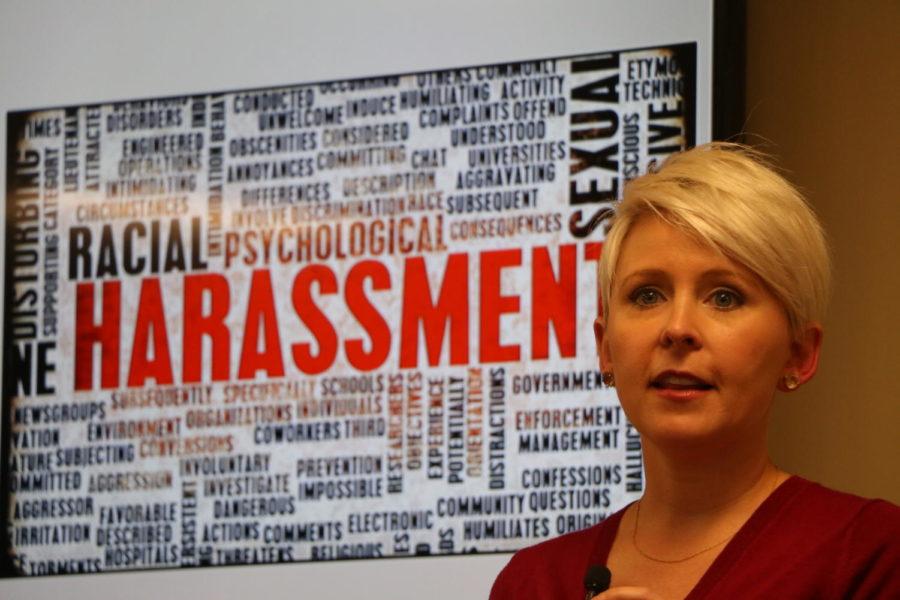- App Content
- App Content / News
- News
- News / Politics And Administration
- News / Politics And Administration / State
Kirsten Anderson discusses workplace harassment with the Ames community
Emily Blobaum/Iowa State Daily
Kirsten Anderson, former communications director for the Iowa Senate Republicans, speaks about her experience with workplace harassment during First Amendment Day on April 11, 2018.
May 13, 2018
Kirsten Anderson, communication professional and advocate for harassment-free work environment, led an in-depth discussion about the issue of sexual harassment and hostility in work space and shared her personal experiences.
Anderson was fired from her job after five years as communications director for Iowa Senate Republicans seven hours after her fourth formal complaint about repeated harassment and retaliatory behavior by staff and lawmakers at the Iowa Statehouse.
She sued the State of Iowa and Iowa Senate Republicans for wrongful termination, harassment and retaliation and was awarded $2.2 million by a jury of her peers.
The discussion was organized by KHOI community radio in partnership with ACCESS Assault Care Center and took place in the upstairs social area of St. John’s by the Campus Episcopal on Saturday.
Anderson started the discussion by asking the audience to share their own experiences when facing sexual harassment in a work environment.
Anne Kinzel, assistant director at Iowa State’s Bioeconomy Institute, told a story about when she worked as a deputy county counsel. She said that she and a public defender were in court and waiting for an assignment one day.
“The judge is a real sexist piece of work,” Kinzel said. “He just yelled at us ‘Hey, you two girls over there, get up here, I need to assign you.’ Everybody else that he yelled at to get up there was ‘Hey, counsel, come up.’ He only yelled ‘girls’ to us.”
After that day, Kinzel and the public defender filed an adjoining complaint.
“We were opponents. We were on the opposite sides of a thing. But we came together for this,” Kinzel said. “The judge was eventually suspended for 60 days, and about a year from that, he resigned.”
Joy Beadleston, producer at KHOI community radio, shared her experience when she worked as a lead clerk supervisor for Greyhound Accounting Center in the 1980s.
“I was raised to always be nice, polite and respectful to people you work with,” Beadleston said. “The work environment was highly sexual and highly harassing. I experience trauma all the time.”
The lead clerk supervisor job was Beadleston’s first “real” job with full benefits. She expected a professional work environment, but it turned out “horrific.”
Beadleston later moved up to the management level and was able to have her own meetings with themes she created. So, she held a meeting for sexual harassment.
“The human relations department got really scared and asked if they can come to the meeting,” Beadleston said. “They took a couple really bad harassers put them in a separate room and took them out of the department. They were not allowed to be alone with any woman anymore.”
Anderson then talked about what she went through when she worked at the statehouse in Des Moines and filed complaints for sexual harassment four times. She said that her complaints were basically ignored by people in the statehouse. The harassments would stop for two weeks, then start again.
“After the third time, my work was getting heavily scrutinized. I would get yelled at for putting commas in the wrong places in the newsletters,“ Anderson said. “That’s when the retaliation started.”
“By the time my fourth complaint rolled around, I was pulling gout hair out. I had nothing left to lose. I was at that breaking point, because I was crying every day.”
Anderson was fired the day she handed in her fourth complaint for poor work products.
In the discussion, audience members asked Anderson what the fundamental flaw the statehouse had that caused the hostile work environment.
Anderson said she thinks it is the lack of human resources professionals.
“They don’t understand what was going on or chose not to. They don’t have a fundamental understanding of HR practices,” Anderson said. “A lot of them would say staff was there to make me look good.”
Anderson also mentioned female on female bullying. She said that sometimes female managers or colleagues would purposely say hurtful things to each other, even criticize each other’s personal life that has nothing to do with work performance.
“It’s a form of exclusion,” Anderson said.
Anderson wrapped up the discussion by saying that people who face workplace sexual harassment should speak up for themselves. They need to recognize and realize the situation they are in, and they don’t need to go along with it.
“The offensive jokes, the pornographic images or even unwanted physical contacts. You should let those people know that it’s not funny and not okay,” Anderson said. “And don’t apologize.”
















